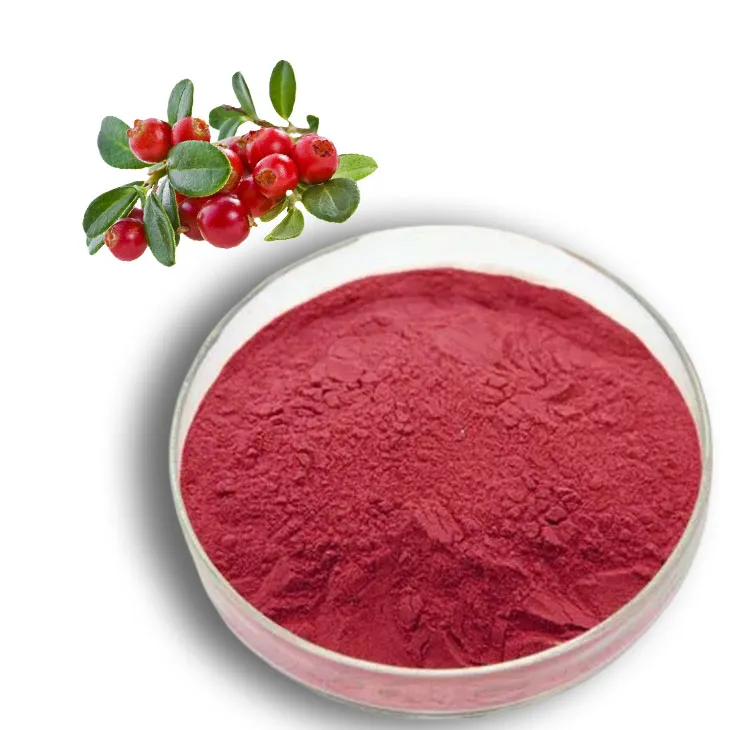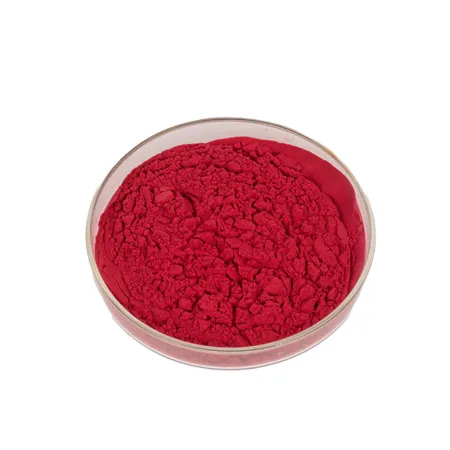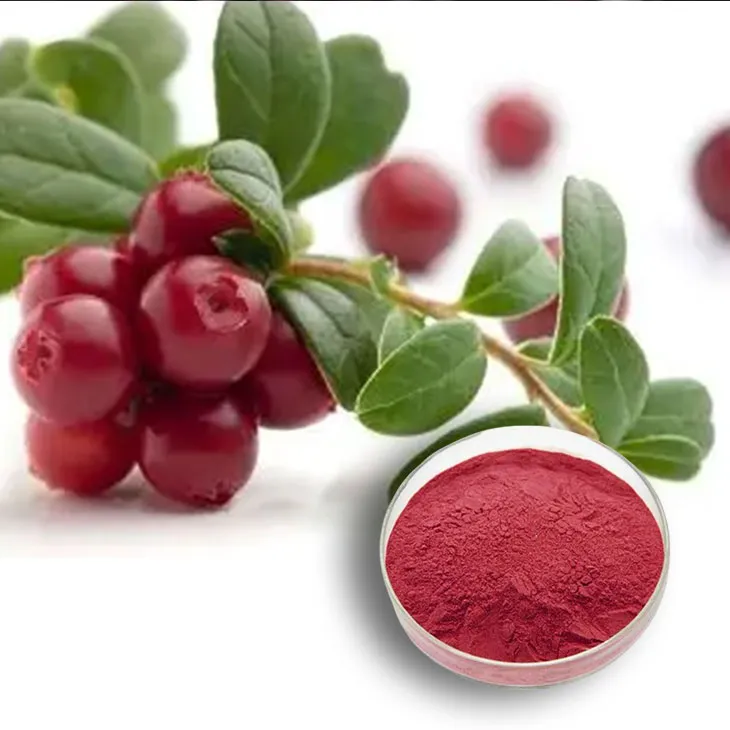- 0086-571-85302990
- sales@greenskybio.com
5 Effects of Cranberry Extract + Dosage, Side Effects
2024-11-11

1. Introduction to Cranberry Extract
Cranberry Extract is derived from the cranberry fruit, which is native to North America. It has been used for centuries by Native Americans for various health purposes. Today, it is widely recognized for its potential health benefits and is available in various forms such as capsules, tablets, and juices. The extract contains a rich blend of nutrients, including vitamins (such as vitamin C), minerals, and bioactive compounds like proanthocyanidins.

2. The Five Major Effects of Cranberry Extract
2.1 Urinary Tract Health
One of the most well - known effects of cranberry extract is its positive impact on urinary tract health. Cranberries contain compounds that prevent bacteria, particularly Escherichia coli (E. coli), from adhering to the walls of the urinary tract. This helps to reduce the risk of urinary tract infections (UTIs). Research has shown that regular consumption of cranberry extract can be beneficial for those who are prone to UTIs, such as women. For example, in a study involving women with a history of recurrent UTIs, those who took cranberry extract had a significantly lower incidence of new infections compared to the control group.
2.2 Antioxidant Properties
Cranberry extract is a rich source of antioxidants, specifically proanthocyanidins. These antioxidants play a crucial role in protecting the body's cells from damage caused by free radicals. Free radicals are unstable molecules that can cause oxidative stress, which is linked to various chronic diseases such as heart disease, cancer, and neurodegenerative disorders. By neutralizing free radicals, cranberry extract helps to maintain the overall health of the body. For instance, in vitro studies have demonstrated the ability of cranberry extract to scavenge free radicals and reduce oxidative damage to cells.
2.3 Cardiovascular Health
There are several ways in which cranberry extract may contribute to cardiovascular health. Firstly, its antioxidant properties help to prevent the oxidation of low - density lipoprotein (LDL) cholesterol, which is a key step in the development of atherosclerosis. Secondly, cranberry extract may have a positive effect on blood pressure. Some studies have suggested that it can help to relax blood vessels, leading to a reduction in blood pressure. Additionally, it may also improve blood lipid profiles by reducing triglyceride levels. For example, a clinical trial found that participants who consumed cranberry extract had a modest but significant improvement in their lipid profiles after a certain period of time.
2.4 Oral Health
The antibacterial properties of cranberry extract are not limited to the urinary tract. It can also be beneficial for oral health. Cranberry extract has been shown to inhibit the growth of oral bacteria, such as Streptococcus mutans, which is a major contributor to tooth decay. By reducing the number of these harmful bacteria in the mouth, cranberry extract can help to prevent cavities and gum disease. Some oral health products now include cranberry extract as an ingredient. In a laboratory study, cranberry extract was found to be effective in reducing the adhesion of S. mutans to tooth surfaces.
2.5 Anti - Inflammatory Effects
Cranberry extract has demonstrated anti - inflammatory properties. Chronic inflammation is associated with many diseases, including autoimmune disorders, arthritis, and certain types of cancer. The bioactive compounds in cranberry extract can modulate the body's inflammatory response. For example, in animal models of inflammation, cranberry extract has been shown to reduce markers of inflammation such as cytokines. This suggests that it may have potential in the treatment or prevention of inflammatory - related diseases in humans.

3. Dosage Guidelines
The appropriate dosage of cranberry extract can vary depending on several factors, including the form of the extract (e.g., concentrate, powder), the intended use, and individual health factors.
- For urinary tract health prevention, a common dosage is around 300 - 500 mg of cranberry extract (standardized to contain a certain percentage of proanthocyanidins) per day. This can be taken in the form of capsules or tablets.
- When using cranberry extract for its antioxidant properties, a dosage of 200 - 400 mg per day may be sufficient. However, some studies have used higher dosages in experimental settings.
- In the case of cardiovascular health or other more complex health conditions, it is advisable to consult a healthcare professional. They may recommend dosages based on an individual's overall health, existing medications, and risk factors. Dosages may range from 400 - 800 mg per day or more in some cases.

4. Side Effects of Cranberry Extract
While cranberry extract is generally considered safe for most people, there are some potential side effects to be aware of.
- Digestive Issues: Some people may experience mild digestive problems such as stomach upset, diarrhea, or nausea when taking cranberry extract. This is more likely to occur with higher dosages or in individuals with sensitive stomachs. To minimize these side effects, it is recommended to start with a lower dosage and gradually increase it if necessary.
- Interaction with Medications: Cranberry extract may interact with certain medications. For example, it can affect the way the body metabolizes warfarin, an anticoagulant drug. This interaction can increase the risk of bleeding. People taking medications such as warfarin, aspirin, or other blood - thinning drugs should consult their doctor before taking cranberry extract.
- Allergic Reactions: Although rare, some individuals may be allergic to cranberries or components of the extract. Allergic reactions can range from mild symptoms such as itching or hives to more severe reactions like anaphylaxis. If any signs of an allergic reaction occur, the use of cranberry extract should be discontinued immediately and medical attention sought.

5. Conclusion
Cranberry extract offers a range of potential health benefits, from promoting urinary tract health to providing antioxidant protection and contributing to cardiovascular and oral health. However, it is important to be aware of the appropriate dosage and potential side effects. As with any supplement, it is advisable to consult a healthcare professional before starting to take cranberry extract, especially if you have underlying health conditions or are taking medications. By understanding the effects, dosage, and side effects of cranberry extract, individuals can make informed decisions about whether this natural supplement may be suitable for their health needs.
FAQ:
What are the five major effects of Cranberry Extract?
Cranberry extract has several significant effects. Firstly, it is well - known for its role in urinary tract health. It may help prevent urinary tract infections by preventing bacteria from adhering to the bladder walls. Secondly, it has antioxidant properties that can combat free radicals in the body, potentially reducing oxidative stress and associated health risks. Thirdly, it may contribute to heart health by helping to regulate blood pressure and cholesterol levels. Fourthly, cranberry extract might have anti - inflammatory effects, which could be beneficial for various inflammatory conditions. Finally, it may also play a role in improving digestive health, for example, by helping to prevent certain gastrointestinal infections.
What are the dosage guidelines for Cranberry Extract?
The appropriate dosage of cranberry extract can vary depending on several factors. For general preventive use against urinary tract infections, a common dosage is around 400 - 500 mg per day. However, for those with a history of recurrent UTIs or specific health concerns, a healthcare provider may recommend a higher dose, up to 1500 mg per day. It's important to note that these are general guidelines, and individual needs may differ. Also, it's crucial to follow the instructions on the product label when using cranberry extract supplements.
What are the possible side effects of Cranberry Extract?
While cranberry extract is generally considered safe for most people, some possible side effects may occur. Mild gastrointestinal issues such as stomach upset, diarrhea, or nausea can happen, especially when taken in high doses. In addition, cranberry extract may interact with certain medications. For example, it could increase the risk of bleeding when taken with anticoagulant medications. People with diabetes should also be cautious as it may affect blood sugar levels. It's always advisable to consult a healthcare provider before starting cranberry extract supplementation, especially if you have pre - existing medical conditions or are taking other medications.
Can Cranberry Extract be used for long - term?
In many cases, cranberry extract can be used for long - term. For example, for individuals prone to urinary tract infections, long - term use at an appropriate dosage may help in preventing recurrent infections. However, as with any supplement, long - term use should be monitored. If any unusual symptoms or side effects develop during long - term use, it is important to consult a healthcare provider. Also, the quality and source of the cranberry extract should be reliable to ensure safety during long - term consumption.
Is Cranberry Extract suitable for everyone?
Cranberry extract is not suitable for everyone. People with a known allergy to cranberries should obviously avoid it. As mentioned before, those taking certain medications, such as anticoagulants or medications for diabetes, need to be cautious as there may be interactions. Pregnant and breastfeeding women should also consult their healthcare providers before using cranberry extract, as there is limited research on its safety in these situations. Additionally, people with kidney stones should be careful as cranberry extract may increase the risk of oxalate - related kidney stones in some cases.
Related literature
- The Health Benefits of Cranberry Extract: A Comprehensive Review"
- "Cranberry Extract and Urinary Tract Health: Dosage, Efficacy, and Safety"
- "Antioxidant Properties of Cranberry Extract: Implications for Chronic Disease Prevention"
- ▶ Hesperidin
- ▶ citrus bioflavonoids
- ▶ plant extract
- ▶ lycopene
- ▶ Diosmin
- ▶ Grape seed extract
- ▶ Sea buckthorn Juice Powder
- ▶ Beetroot powder
- ▶ Hops Extract
- ▶ Artichoke Extract
- ▶ Reishi mushroom extract
- ▶ Astaxanthin
- ▶ Green Tea Extract
- ▶ Curcumin Extract
- ▶ Horse Chestnut Extract
- ▶ Other Problems
- ▶ Boswellia Serrata Extract
- ▶ Resveratrol Extract
- ▶ Marigold Extract
- ▶ Grape Leaf Extract
- ▶ blog3
-
Cranberry Plants and Skin - care Products.
2024-11-11
-
Acerola Juice Powder
2024-11-11
-
Aminolevulinic acid
2024-11-11
-
Konjac Powder
2024-11-11
-
Panax Ginseng Leaf Extract
2024-11-11
-
Diosmin
2024-11-11
-
Moringa powder
2024-11-11
-
Senna Leaf Extract
2024-11-11
-
Feverfew Extract
2024-11-11
-
Epimedium extract powder
2024-11-11
-
Ginger Extract
2024-11-11





















